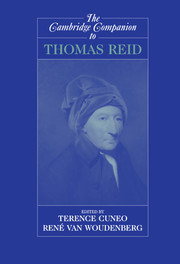Book contents
- Frontmatter
- Introduction
- 1 Reid in Context
- 2 Thomas Reid and the Culture of Science
- 3 Reid on Common Sense
- 4 Reid’s Theory of Perception
- 5 Reid’s Reply to the Skeptic
- 6 Nativism and the Nature of Thought in Reid’s Account of Our Knowledge of the External World
- 7 Reid and the Social Operations of Mind
- 8 Reid on Memory and the Identity of Persons
- 9 Thomas Reid’s Theory of Freedom and Responsibility
- 10 Reid’s Moral Philosophy
- 11 Reid’s Philosophy of Art
- 12 Reid’s Philosophy of Religion
- 13 Reid’s Influence in Britain, Germany, France, and America
- Bibliography
- Index
12 - Reid’s Philosophy of Religion
Published online by Cambridge University Press: 28 May 2006
- Frontmatter
- Introduction
- 1 Reid in Context
- 2 Thomas Reid and the Culture of Science
- 3 Reid on Common Sense
- 4 Reid’s Theory of Perception
- 5 Reid’s Reply to the Skeptic
- 6 Nativism and the Nature of Thought in Reid’s Account of Our Knowledge of the External World
- 7 Reid and the Social Operations of Mind
- 8 Reid on Memory and the Identity of Persons
- 9 Thomas Reid’s Theory of Freedom and Responsibility
- 10 Reid’s Moral Philosophy
- 11 Reid’s Philosophy of Art
- 12 Reid’s Philosophy of Religion
- 13 Reid’s Influence in Britain, Germany, France, and America
- Bibliography
- Index
Summary
Thomas Reid was a Christian philosopher. He never wavered from his theism or Christian belief, and a temperate, sincere faith pervades his writing and his biography. Apparently orthodox in belief, he wasn't given to theological and ecclesiastical controversies, but he did have a life-long interest in what we now call philosophy of religion issues. From 1751 to 1780 Reid's lectures included the subject of natural theology, or what can be known about God apart from revelation. Reid's notes for these lectures are almost entirely lost, but several student transcriptions from his lectures at Glasgow University (1763-1780) survive.2
Reid is a unique anti-medieval early modern theist, perhaps the last great Newtonian theist. An admirer of Samuel Clarke and Joseph Butler, he combines the rationalistic apologetics of the early eighteenth century with an antispeculative bent and a keen eye for human psychology. He doesn’t hesitate to employ the tools of philosophy in matters of religion. We shouldn’t, he says, be led by “zeal for religion” to defame reason in a rush to exalt revelation (EAP IV.xi: 636a). In this way Calvinism and Bayle, he saw, paved the way for Hume and other critics of religion.3 Although he continually emphasizes the limits of human understanding, Reid insists that “Revelation was not intended to supersede, but to aid the use of our natural faculties” (EAP V.ii: 641b).
- Type
- Chapter
- Information
- The Cambridge Companion to Thomas Reid , pp. 289 - 312Publisher: Cambridge University PressPrint publication year: 2004
- 8
- Cited by

